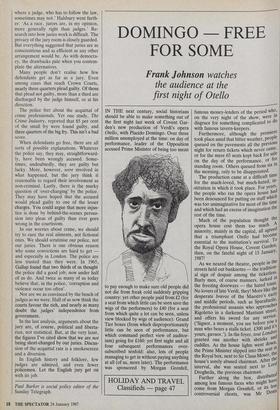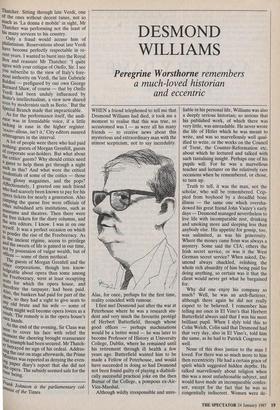DOMINGO FREE FOR SOME
Frank Johnson watches
the audience at the first night of Otello
IN THE next century, social historians should be able to make something out of the first night last week of Covent Gar- den's new production of Verdi's opera Otello, with Placido Domingo. Over three million unemployed at the time: on day of performance, leader of the Opposition accused Prime Minister of being too mean to pay enough to make sure old people did not die from freak cold suddenly gripping country: yet other people paid from £2 (for a seat from which little can be seen save the wigs of the performers) to £40 (for a seat from which quite a lot can be seen, unless view blocked by wigs of audience): Grand Tier boxes (from which disproportionately little can be seen of performance, but which command perfect view of auditor- ium) going for £160: yet first night and all four subsequent performances over- subscribed tenfold: also, lots of people managing to get in without paying anything at all (of us, more later). The performance was sponsored by Morgan Grenfell famous money-lenders of the period who, on the very night of the show, were in disgrace for something complicated to d° with famous tavern-keepers. Furthermore, although the premiere took place amid that bitter weather, people queued on the pavements all the previous night for return tickets which never came, or for the mere 65 seats kept back for sale on the day of the performance, or for standing room. Others queued from six in the morning, only to be disappointed. The production came at a difficult time for the much-loved, but much-hated, in- stitution in which it took place. For years, the people who ran the opera house had been denounced for putting on stuff which was too unimaginative for most of the tune and which had an excess of imagination the rest of the time. Much of the population thought the opera house cost them too much. A minority, mainly in the capital, all agreed that a triumphant Otello had become essential to the institution's survival. T° the Royal Opera House, Covent Garden, then, on the fateful night of 13 Jarman', 1987! As we neared the theatre, people in the streets held out banknotes — the tradition- al sign of despair among the ticketless. Burly men, of coarse manners, lurked in the freezing doorways — the hated touts. No lovers of late Verdi, they! More like the desperate bravos of the Maestro's earlY and middle periods, such as Sparafucile, the professional assassin who approaches Rigoletto in a darkened Mantuan street, and offers his sword for any service. ('Signor, a moment, you see before you a man who bears a stalls ticket. £300 and it's yours, guvnor.'). In the foyer, tout Londres. greeted one another with shrieks an cuddles. As the house lights went down, the Prime Minister slipped into the seat in the Royal box, next to Sir Claus Moser, the house's sorely abused chairman. After the interval, she was seated next to Dr" Drogheda, the previous chairman. Further along the box, distributed among less famous faces who might have come from Morgan Grenfell, or its less controversial clients, was Mr Denis
Thatcher. Sitting through late Verdi, one of the ones without decent tunes, not so much as 'La donna e mobile' in sight, Mr Thatcher was performing not the least of his many services to his country.
Only a fraud would accuse him of Philistinism. Reservations about late Verdi have become perfectly respectable in re- cent years. I wanted to burst into the Royal Box and reassure Mr Thatcher: 'I quite
agree with your critique of Otello, Sir. I see You subscribe to the view of Italy's fore- most authority on Verdi, the late Gabriele Baldini — prefigured by our own George Bernard Shaw, of course — that by Otello Verdi had been unduly influenced by Boito's intellectualism, a view now shared even by modernists such as Berio.' But the Special Branch made that impracticable. As for the performance itself, the audi- ence was in formidable voice, if a little lacking in ease in the higher register. MAI-Iv-allous, isn't it,' City editors assured arbitrageurs in the interval. A lot of people were there who had paid nothing: guests of Morgan Grenfell, guests of corporate seat-holders. But what about the critics' guests? Why should critics need a guest to help them get through a night such as this? And what were the critical credentials of some of the critics — those from glossy magazines, and the pops? Affectionately, I greeted one such friend Who had scarcely been known to pay for his °Pera tickets for nearly a generation. Also lumping the queue free were officials of other subsidised arts institutions, such as Museums and theatres. Then there were the free tickets for the diary columns, and the arts editors. I know. I was in on one It was a perfect occasion on which to Ponder the rise of the Freebocracy. As In the ancient regime, access to privilege and the sweets of life is gained in our time, not by possession of vulgar wealth, but of offices — some of them mythical.
„,,`
The guests of Morgan Grenfell and the other corporations, though less know- ledgeable about opera than some among the Freebocracy, were at least occupying hats for which the opera house, and therefore the taxpayer, had been paid. Its so, the bankers had paid for part of the "ow, so they had a right to give seats to hoold brute and his wife — some of might well become opera lovers as a result. The remedy is in the opera house's own hands.
At the end of the evening, Sir Claus was seen to cover his face with relief the
that the cheering brought reassurance e',.at triumph had been secured. Mr Thatch- , betrayed no sign of his ordeal. Addres- m0.g the cast on stage afterwards, the Prime ister was reported as denying the even- ing diary's report that she did not ti'e opera. The subsidy seemed safe for the
me being.
P4414k Johnson is the parliamentary col- "oust of the Times



















































 Previous page
Previous page